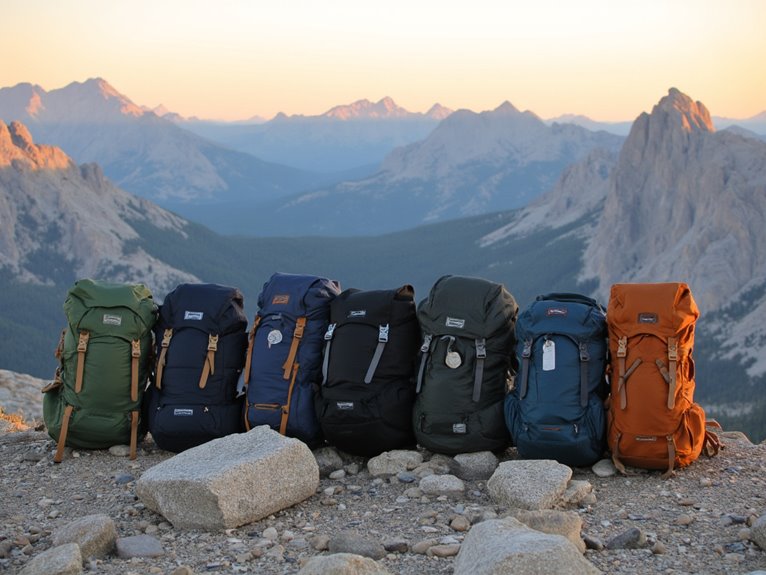What Is the Safest Fuel for Camp Stoves?
In the realm of camp stoves, the safest fuel choice depends on a combination of factors, including the type of stove, camping conditions, and personal preferences. White gas, known for its reliability and low volatility, is a popular choice. Propane, widely available and clean-burning, is another safe option. Diesel fuel, with its high energy density and low environmental impact, is also a viable choice. Ultimately, the safest fuel for camp stoves is one that balances convenience, cost, and environmental concerns, while prioritizing safety precautions and responsible fuel handling. Delve into the unique characteristics of each fuel option to make an informed decision.
We are supported by our audience. When you purchase through links on our site, we may earn an affiliate commission, at no extra cost for you. Learn more. Last update on 23rd January 2026 / Images from Amazon Product Advertising API.
Understanding Fuel Types and Risks
When venturing into the wilderness, campers often overlook the critical consideration of fuel type, which can have significant implications for safety, performance, and environmental impact. The choice of fuel can affect the stove's efficiency, reliability, and overall camping experience. Different fuels pose varying risks, such as explosion hazards, carbon monoxide poisoning, and environmental contamination. Understanding the characteristics and risks associated with each fuel type is essential for making informed decisions. Campers must consider factors like flash points, volatility, and combustion byproducts to guarantee a safe and enjoyable camping experience. By recognizing the importance of fuel type, campers can mitigate potential hazards and optimize their camping setup, thereby safeguarding a trouble-free adventure.
White Gas: The Classic Option
Nearly a century after its introduction, white gas remains a popular choice among campers due to its high energy density, reliability, and widespread availability. This refined petroleum-based fuel is a trusted option for camp stoves, offering a high BTU output and efficient combustion. White gas is also relatively inexpensive and can be found at most outdoor gear retailers. Another advantage of white gas is its low volatility, making it a safer choice compared to other fuels. Additionally, white gas is a clean-burning fuel, producing minimal soot and residue, which makes stove maintenance easier. Overall, white gas is a reliable and efficient fuel option for campers, making it a classic choice for many outdoor enthusiasts.
Canister Fuels: Convenience and Trade-Offs
When considering canister fuels, several key factors come into play. The shelf life of these fuels is a critical consideration, as degradation over time can impact performance and safety. Additionally, the portability and pressurization characteristics of canister options must be carefully evaluated to guarantee a safe and convenient camping experience, and to certify a hassle-free outdoor adventure.
Fuel Shelf Life Matters
Canister fuels, a popular choice among campers, boast an impressive shelf life, but this convenience comes with trade-offs that outdoor enthusiasts should carefully consider. With a typical shelf life of 5-7 years, canister fuels offer a convenient storage solution for campers. However, this extended shelf life often comes at the cost of decreased performance and efficiency. As canister fuels sit on the shelf, they may degrade, affecting their burn quality and potentially causing equipment malfunction. Additionally, the fuel's potency may decrease, leading to reduced heat output and cooking times. Campers should weigh the benefits of convenience against the potential drawbacks of decreased performance when choosing canister fuels.
Portable Canister Options
Among the most popular portable canister options, MSR and Coleman are two well-established brands that offer a range of fuels suitable for camping and backpacking applications. These canisters typically contain a refined petroleum-based fuel, such as isobutane or propane, which provides a high energy density and efficient combustion. The convenience of canister fuels lies in their ease of use, as they are often self-sealing and require minimal maintenance. However, this convenience comes at a trade-off, as canister fuels tend to be more expensive than other options and generate more waste. Additionally, the canisters themselves can be bulky and heavy, making them less ideal for ultralight backpackers. Despite these drawbacks, canister fuels remain a popular choice for many outdoor enthusiasts due to their reliability and ease of use.
Pressurization Concerns
Fuel pressurization issues can arise from improper storage or handling of canisters, which can lead to compromised performance, reduced efficiency, and even safety hazards. When canisters are exposed to extreme temperatures, dropped, or damaged, the fuel inside can become over-pressurized, causing the canister to rupture or leak. To avoid these issues, it's essential to:
- Store canisters in a cool, dry place, away from direct sunlight and heat sources.
- Handle canisters with care, avoiding drops and impacts that can cause damage.
- Regularly inspect canisters for signs of damage or wear, and replace them as needed.
Diesel Fuel: A Camping Alternative
Diesel fuel, often overlooked in favor of more traditional camping fuels, presents a viable alternative for campers seeking a reliable and efficient energy source. With a high energy density, diesel fuel provides a longer burning time compared to other fuels, making it an attractive option for extended camping trips. Additionally, diesel fuel is less prone to evaporation, reducing the risk of fuel loss and environmental impact. Its high flash point also makes it a safer choice, as it is less likely to ignite accidentally. When used in a well-maintained stove, diesel fuel can provide a clean and efficient burn, making it a reliable choice for campers.
Biofuels: The Environmentally Friendly Choice
Biofuels: The Environmentally Friendly Choice
Increasingly, environmentally conscious campers are turning to biofuels as a sustainable alternative to traditional camping fuels. Biofuels are derived from organic matter such as plants, algae, or agricultural waste, making them a cleaner and more eco-friendly option.
Biofuels offer several benefits for camping:
- Reduced carbon footprint: Biofuels produce substantially less greenhouse gas emissions compared to traditional fuels.
- Renewable resource: Biofuels are made from renewable sources, reducing dependence on fossil fuels.
- Locally sourced: Many biofuels are produced locally, supporting local economies and communities.
Propane: A Popular and Safe Option
In terms of camping, propane is a popular choice for camp stoves due to its widespread availability worldwide. This fuel type offers a convenient and reliable option for outdoor enthusiasts, with a widespread distribution network that guarantees accessibility in most regions. In addition, propane is a relatively clean-burning fuel, producing low carbon emissions that minimize its environmental impact.
Propane Availability Worldwide
Available in over 100 countries, propane is a widely accessible fuel option for camp stoves, making it a reliable choice for outdoor enthusiasts and adventurers worldwide. This widespread availability guarantees that campers can easily find propane refills or replacements, even in remote areas. Whether you're trekking through the Himalayas or exploring the Amazon rainforest, propane is a trustworthy fuel source that can keep up with your adventures.
Here are just a few examples of propane's global reach:
- Mountainous regions: From the Rocky Mountains to the Swiss Alps, propane is readily available at outdoor gear stores and campgrounds.
- Remote wilderness areas: Propane can be found at rural general stores and outfitters in areas like Alaska, the Yukon, and the Australian Outback.
- International cities: Major cities like Tokyo, Paris, and Sydney have numerous retailers that carry propane for camp stoves, allowing campers to confidently fuel their adventures.
Low Carbon Emissions
Propane's reputation as a safe and popular fuel option for camp stoves is further boosted by its relatively low carbon emissions, making it an environmentally friendly choice for outdoor enthusiasts. With a carbon intensity of 18.72 kg CO2e per gigajoule, propane emits substantially less greenhouse gases compared to other fuels like diesel or gasoline. This reduced carbon footprint is particularly important for environmentally conscious campers who want to minimize their impact on the environment. Additionally, propane is a clean-burning fuel that produces minimal air pollutants, making it a safe choice for both users and the environment. Overall, propane's low carbon emissions make it an attractive option for campers seeking a safe and eco-friendly fuel solution.
Electric Camp Stoves: A Fuel-Free Alternative
Electric camp stoves offer a convenient and environmentally friendly alternative to traditional fuel-based camping stoves, eliminating the need for fuel storage and disposal. They provide a reliable and efficient cooking solution, perfect for camping trips or backyard gatherings. With electric camp stoves, you can enjoy a hassle-free cooking experience without the risk of fuel spills or leaks.
Here are three benefits of electric camp stoves:
- Zero Emissions: Electric camp stoves produce no carbon emissions, making them an eco-friendly choice for outdoor enthusiasts.
- Easy Cleanup: Electric camp stoves are easy to clean and maintain, with no messy fuel residue or soot buildup.
- Portability: Electric camp stoves are lightweight and compact, making them easy to transport and store.
Fuel Safety Precautions and Tips
When using fuel-based camping stoves, it's crucial to exercise caution and follow proper safety protocols to avoid accidents and guarantee a safe cooking experience. Always read and follow the manufacturer's instructions, and take the time to properly assemble and maintain your stove. Keep a fire extinguisher or a bucket of sand nearby in case of emergencies. Store fuel in a well-ventilated area, away from heat sources and open flames. When handling fuel, avoid spills and splatters, and wear protective gloves and eyewear. Never leave a burning stove unattended, and confirm it's fully extinguished before leaving it unattended. By following these simple safety precautions, you can minimize risks and enjoy a safe and enjoyable camping experience.
Choosing the Safest Fuel for You
Among the various fuel options available, white gas, canister fuel, and diesel are three popular choices for camp stoves, each with its unique characteristics, advantages, and safety considerations. When choosing the safest fuel for you, consider the following key factors:
- Environmental Conditions: Will you be camping in extreme temperatures, high altitudes, or humid environments?
- Stove Compatibility: Is your stove designed to work with a specific type of fuel?
- Personal Preference: Do you prioritize convenience, cost, or environmental impact?




